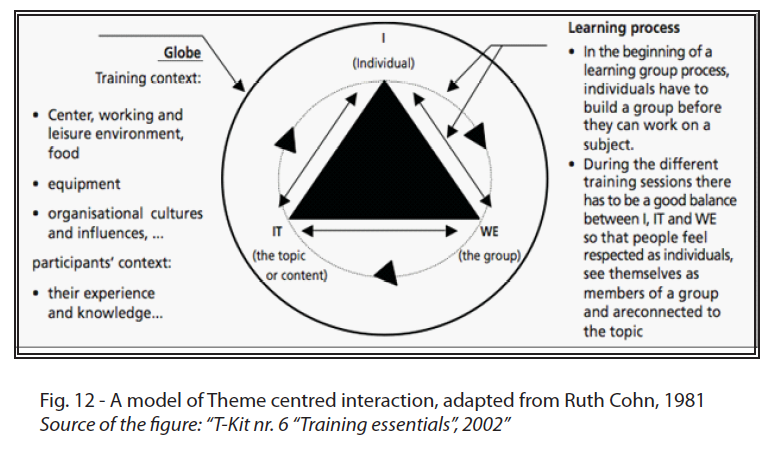6
GameOn: Non-formal learning in Game design
GameOn: Non-formal learning in Game design
Inhalt
This learning playlist explores the essentials of non-formal learning and how this methodology can be applied in the game design process.
Complete all playlist activities to learn about:
- What is non-formal learning?
- What are the values and principles that guide non-formal learning?
- How does non-formal learning look in practice?
- How can you apply non-formal learning in a game design process?
Watch this video that introduces how games and game design can be used as a tool in non-formal learning:
Follow the following playlist activities to develop your non-formal learning understanding and competences to support better the learning of people involved in the game design process.
The international partnership “GameOn” created this playlist to promote inclusion, participation and critical thinking through game design. Learn more about this partnership here.
Expert partners:
Nexes (ES) – lead partner, Idealúdica (ES), Universitat de Barcelona (ES), BalkanIdea Novi Sad (SR), Nectarus (LT), Associazione Interculturale NUR (IT).
Co-funded by the Erasmus+ Programme of the European Union.
Aktivitäten zu Fertigstellung
Schließe die folgenden Aktivitäten ab und erhalte Open Badge, um deinen Playlist- Fortschritt zu fördern
Inhalt
Game design process may become a great non-formal learning experience.
In this activity you will be able to get some ideas on how to apply non-formal learning in the game design process. Visit other activities of the playlist “GameOn: Non-formal learning in Game design” to explore more on how to apply non-formal learning in the game design process.
Experiential learning
Game design experience can be a source for learning and development. You can follow the Kolb cycle to support and encourage people to take the most learning from this experience.
Watch this video and reflect on the following:
- Which steps of the Kolb cycle do you follow in your education practice?
- How can you use the Kolb’s cycle in the game design process?
Theme-centred interaction
In the educational game design process the group of people are designing a game on a specific theme or topic, for example migration, conflicts, racism, exclusion.
As a non-formal educator, you may help the group members keep a good balance of attention to individuals of the group, group processes, the theme/topic and a wider environment.
Look at the image below and think what questions can you ask to the group involved in the game design process to stimulate their learning.

Importance of feedback
You can support learning greatly by including review and feedback at different stages of the game design process.
You may complete the activity and earn a digital badge by adding your reflections to the badge evidence below. In the resources you may find additional reference documents to advance your learning on the models explored in this activity.
This activity is part of the wider educational effort of the international partnership “GameOn” to promote inclusion, participation and critical thinking through game design. Learn more about this partnership here.
Expert partners:
Nexes (ES) – the lead partner, Idealúdica (ES), Universitat de Barcelona (ES), BalkanIdea Novi Sad (SR), Nectarus (LT), Associazione Interculturale NUR (IT).
Co-funded by the Erasmus+ Programme of the European Union
Erhalte einen Badge für diese Aktivität
GameOn: Non-formal learning meets the game design Erhalte diesen Badge
Earners of this badge explored content and resources on applying non-formal learning in the game design process.
They had opportunities to get familiar with:
- the experiential learning and the use of Kolb’s cycle
- the Theme-centered interaction model and how it can support the group learning process
- the importance
The evidence of completing this activity is included in the badge and was reviewed by the organisers.
This activity is part of the wider educational effort of the international partnership “GameOn” to promote inclusion, participation and critical thinking through game design. Learn more about this partnership here.
Aufgaben
Aufgabe Nr. 1
Nachweis verifiziert von: Selbstbestätigung
Explore content and resources on experiential learning, theme-centered interaction and feedback. Share your thoughts on the following questions to earn the activity badge:
- How can you apply specific models to support learning and development through the game design process?
- What questions do you have about the models and practices presented in this activity?
Fähigkeiten
#cities of learning
ESCO
#Lerntechnologien
#connected learning
ESCO
#Lernstrategien einsetzen
ESCO
#Einstellung und Werte
Aktivitäten: 5
Begonnen: 17
Absolvierte Playlists: 0
Teilen:
Ausführende Organisation
GameOn - Game Design for Inclusion
Andere Sprache auswählen:

